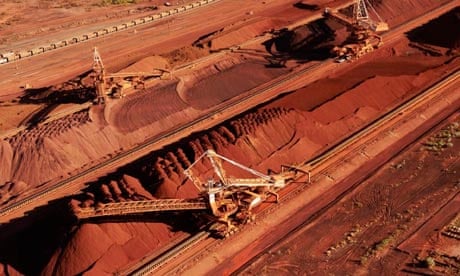Marc Faber, the Swiss investor and ultra bear, says there have been four mega bubbles in the past 40 years. In the 1970s it was gold; in the 1980s it was the Nikkei, and in the 1990s it was the Nasdaq. Bigger than all of them, though, has been the iron ore bubble, a tenfold increase in prices in less than a decade.
Iron ore is the raw material for steel, production of which has rocketed as a result of China's economic boom. Consider the following facts. In the past 15 years, China has built 90 million new homes – enough to house the populations of the UK, France and Germany combined. A quarter of global steel demand is for Chinese property and Chinese infrastructure.
Commodity-rich countries, like Australia, have never had it so good. China takes 25% of Australia's exports and iron ore accounts for 60% of all the goods Australia sells to China. One reason Australia avoided recession during the global downturn of 2008-09 was that it had a well-run banking system. A much bigger reason was that the country had become a giant pit from which China could extract the minerals it needed for its industrial expansion. Money flooded into the country from sovereign wealth funds and hedge funds looking for AAA investments. The Australian dollar has soared, as have property prices.
China's economy is now slowing, and although the economic data is not particularly reliable, it seems to be slowing fast. The country has two million unsold homes, with another 30 million under construction. There is a glut of iron ore and the price is falling. Where does that leave Australia? Horribly exposed, quite obviously. It has an over-valued currency, an over-valued property market, and its major customer is now desperately pulling every available policy lever in the hope of avoiding a hard landing. Whatever happens, the Australian dollar is a sell. Just how big a sell will depend on how successful Beijing is in reflating the Chinese economy.



Comments (…)
Sign in or create your Guardian account to join the discussion